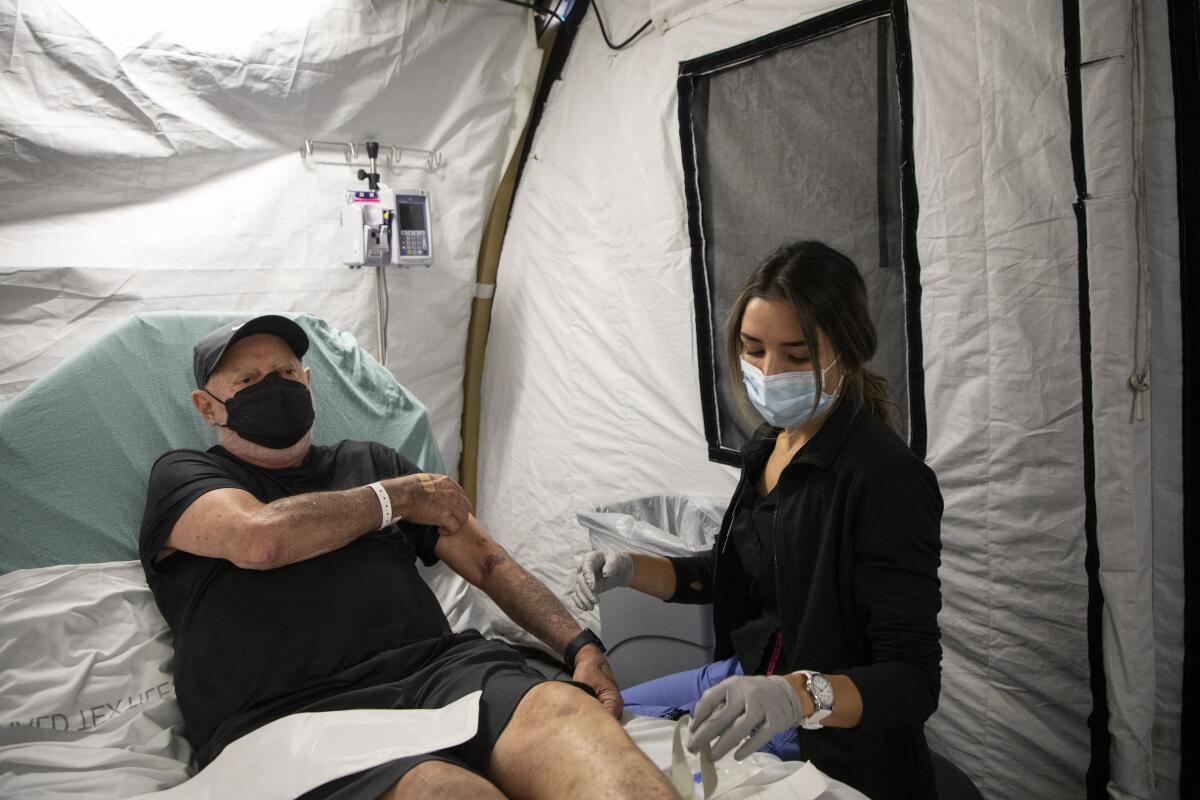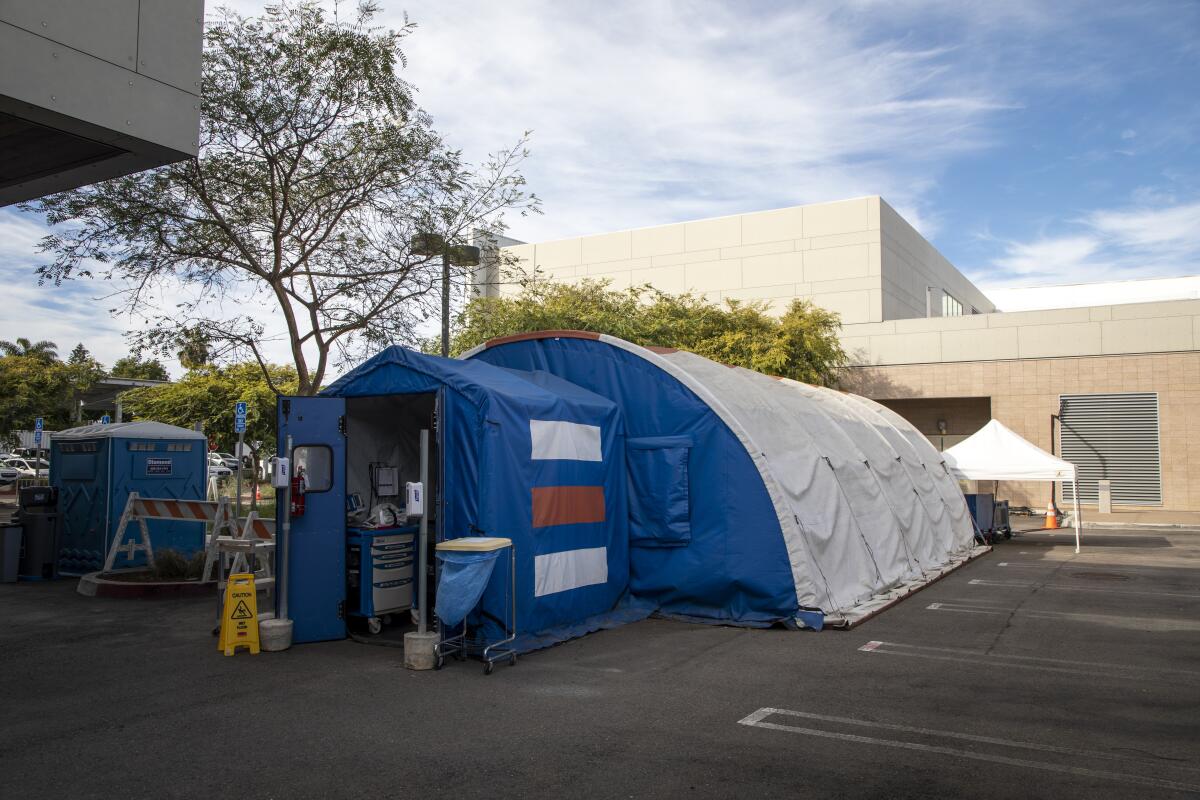Uptick in flu cases prompts San Diego County hospitals to erect overflow tents to ease ER burden

- Share via
SAN DIEGO — San Diego County’s early flu season has begun to put enough pressure on local emergency departments that patient care is sometimes spilling into parking lots.
Scripps Memorial Hospital Encinitas, Jacobs Medical Center at UCSD Health in La Jolla and Sharp Grossmont Hospital in La Mesa all reported Friday that they have begun using overflow tents outside their normal emergency department buildings to handle a current increase of respiratory illness.
The worsening of the overall situation is plain to see in the numbers.
About 9% of emergency room patients had flu symptoms last week, up two percentage points from two weeks ago, with COVID-19 symptoms also increasing, though not as quickly, according to the county’s weekly respiratory illness report.
It tells only part of the story because it does not include the current increase in activity of respiratory syncytial virus, a cause of the common cold, which is a particular threat to very young children and seniors.
As to where the current situation is headed, nobody seems quite sure.
Generally, the flu hits hardest from late December through February. But as was the case in the Southern Hemisphere, influenza made itself known in the fall this year. Does that mean that it’s likely to burn itself out by Christmas, following a similar pattern as normal seasons but just shifted earlier this time around?
Nobody seems confident they have the answer.

“The real question is whether it’s shooting to an early peak or whether it’s going to be a sustained rise, and I don’t think there’s enough evidence right now to really tell,” said Dr. Cameron Kaiser, deputy public health officer for San Diego County.
As a result, healthcare providers across the region are planning for the worst and hoping for the best.
While she said she and her colleagues would be delighted if the flu fizzled toward the end of the year due to its early start, Dr. Ghazala Sharieff, chief medical officer of acute care operations and clinical excellence at Scripps Health, said the assumption is that this will be a long winter.
“The fear is that everything is just sort of bouncing off everything else and once you’ve been through the flu you could still get hit by COVID or whatever other virus you’re going to get,” Sharieff said. “I’m hopeful, but we’re still kind of planning that it’s going to be this way through February.”
For the moment, emergency departments are the busiest locations. Scripps hospitals and doctors offices have recorded 1,695 positive flu tests since Sept. 1 compared with 471 during the same span last year.
While that has been enough to require using overflow tents to keep up with demand, the executive said that a percentage have been getting ill enough to be admitted to a hospital. Thus far, it has been possible for staff to keep up with the demand made by these cases, but that could change if more staffers end up getting sick and staying home from work.
“Right now, we’re OK, but I do worry, as we get into Thanksgiving, Christmas as we have flu and COVID, about the sick calls,” Sharieff said. “We’re trying our best to get ahead as much as we can now and get as many scheduled surgeries done as we can.”
Dr. William Tseng, an internal medicine specialist with Kaiser Permanente in San Diego, said this week that he agrees that hospitals are not yet feeling the full brunt of the flu, but could be in for a more severe run as the holidays arrive.
“If you look at the growth that we’ve seen in cases, it’s only just a matter of time,” Tseng said. “We know that it’s only at the beginning of the curve in terms of flu, and RSV and COVID are a simultaneous threat.”
Across the board, all those in the medical professions are urging the public to get vaccinated.
While flu vaccination got off to a bit of a slow start this fall, the latest numbers from the region’s vaccination registry show that there was a stronger surge in October. Nearly 800,000 residents have received their flu shots so far this year, a number that should land the total number of inoculations somewhere close to the 1.2 million given out through the entire 2021-22 season.
Comparatively few have so far availed themselves of the new “bivalent” COVID-19 booster shot. According to the latest update, 328,172 of these boosters have been administered in San Diego County out of the nearly 2.5 million who are eligible.
For those who do still end up getting sick and heading to a medical professional, Sharieff pleaded for kindness. No one, she said, wants a return to the backlash against healthcare workers that flared in 2021.
“Everyone is already tired and, like, why would I come in and work extra shifts if I’m gonna get yelled at?” Sharieff said.
More to Read
Sign up for Essential California
The most important California stories and recommendations in your inbox every morning.
You may occasionally receive promotional content from the Los Angeles Times.











